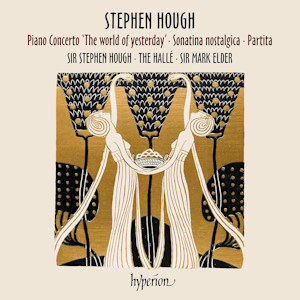
Stephen Hough (b. 1961)
Piano Concerto ‘The world of yesterday’ (2023)
Sonatina nostalgica (2019)
Partita (2019)
Sir Stephen Hough (piano)
Hallé Orchestra/Sir Mark Elder
rec. live, 15, 16 & 19 May 2024, Bridgewater Hall, Manchester, UK (Concerto); 11 June 2024, (Sonatina), 11 September 2024, (Partita), St Silas the Martyr, Kentish Town, UK
Reviewed as download from a press preview
Hyperion CDA68455 [40]
Stefan Zweig’s memoir, ‘The World of Yesterday’ is a nostalgic, at times elegiac, beautifully written account of what he wanted to memorialise in European culture of the late nineteenth and early twentieth centuries. Stephen Hough’s purpose in his use of Zweig’s title for his gem of a piano concerto is twofold: he very much wants to place us in the Vienna Zweig knew, but at the same time, recall the era from Mozart to Bartók when great pianists were also composers. ‘Nostalgia both literal and legendary’ as he says in his booklet note. The concerto started life as sketches for a film score, whose key characters were an elderly Austrian aristocrat and a young American composer. Although the direction of the film changed and Hough didn’t realise the score, his work on the sketches provided one other crucial element of musical vocabulary he went on to use, that of interwar America.
So, fin de siècle Vienna, great composer pianists and what Hough calls the ‘bright white notes…of Americana’. It’s a heady mix, triumphantly executed. We’re presented with a rich set of evocations, which seem to flash by (the whole piece is just over twenty minutes in length). The cleverness and invention in the writing is evident but unshowy and crucially Hough somehow manages his Proustian tugs on our real or imagined memories without serving up layers of pastiche, avoiding one of the traps he sees in writing a piano concerto in the twenty first century, that of, as he writes, ‘regurgitating examples from the past—tired figuration dusted off and redressed for the new season’.
The concerto (played as continuous movement in three sections) starts with a simple ‘white note’ melody that is developed between strings and woodwind before, in a real coup de théâtre, the piano enters and plays an extended cadenza. This is a really daring compositional decision I think, and it pays off handsomely, propelling the brilliant writing which follows: an ingenious set of variations on a Korngoldesque waltz theme and an increasingly frantic finale in the form of a Tarantella. All of this inhabited by touches of those composer pianists, most of all Rachmaninov, perhaps unsurprisingly given Hough’s performance history, but I was also struck by tantalising echoes of Prokofiev.
It was a great decision by Hyperion to send a recording team to the Bridgewater Hall last May to record the first performances. It hardly needs saying that Hough performs his composition with typical effervescence, flair and brio. He has fine collaborators in Mark Elder and the Hallé, the dialogue between orchestra and piano in the middle section variations in particular being a real delight. With a fair wind, I think this could become the popular work it deserves to be. There are performances coming up in the UK, the USA and Australia in the next few months, so it seems well set.
The album has two other compositions. Like the Piano Concerto, both are infused by a sense of the past. The tiny Sonatina nostalgica, written as a celebration of the seventieth birthday of Hough’s fellow pianist and friend Philip Fowke in 2019, consists of three deft vignettes depicting places in the village of Lymm in Cheshire, close to where Hough grew up. Perhaps the very specifically titled movements help, and the two simple motifs Hough bases the piece on certainly do, but a strong sense of a different (and happy) time and place is powerfully conveyed in its less than five minutes duration.
The Partita, also from 2019, was commissioned by the Walter W Naumburg Foundation for its 2017 competition winner, Albert Cano Smi. After completing four rather serious piano sonatas Hough writes he was keen to write something different and was again drawn to nostalgia and specifically to the music of the early twentieth century. There are two relatively long outer movements, an Overture, which has real grandiosity and stature and an exciting, technically demanding Toccata. The shorter middle movements are contrasting and appropriately dance like. I particularly liked the bluesy Canción y Danza II, one of two pieces inspired by Federico Mompou, whose music Hough has memorably recorded.
Hough’s playing of both solo pieces is everything we’ve come to expect, incisive, lyrical, with a typically lovely touch in some of the more introspective moments and real power and authority in the outer movements in the Partita. The whole album is only around forty minutes in length, and I have enjoyed the opportunity it provides to focus on just these compositions, all of which have a fleeting, elusive quality about them, like memories themselves dare I say. I’ve listened to little else all week.
Dominic Hartley
Buying this recording via a link below generates revenue for MWI, which helps the site remain free



















